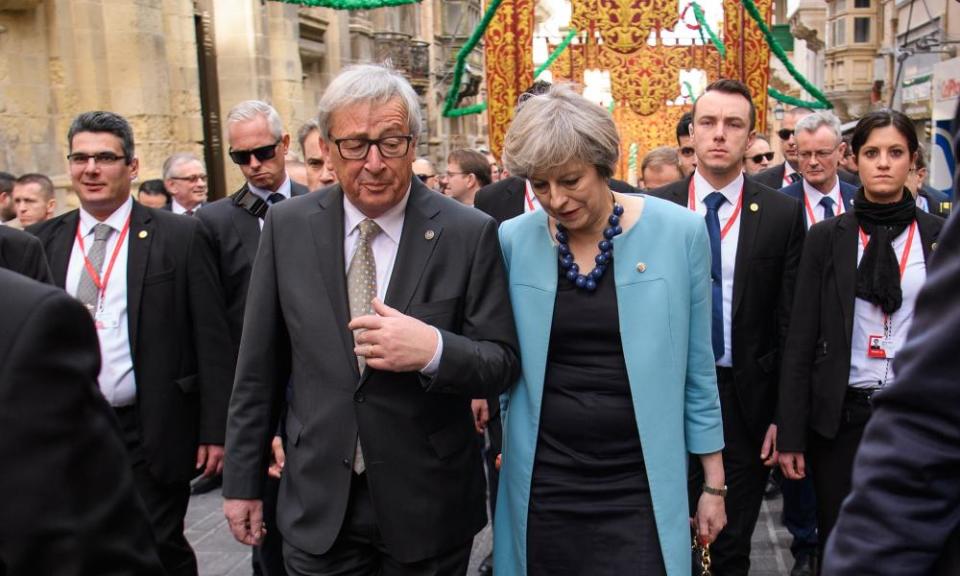EU states back call for UK to agree €60bn exit bill before trade talks

EU member states are backing a European commission demand that trade talks can only start once Britain has agreed to pay a hefty Brexit bill, despite fears of a backlash from Theresa May.
The Czech Republic has joined Germany, Italy and France in insisting the UK must come to an arrangement on the divorce settlement, expected to come to about €60bn (£50bn), before any substantive negotiations on a future relationship.
The move comes despite privately held concerns in Brussels, expressed in a document obtained by the Guardian, that Britain will react badly to the bill.
“The scenario of setting a heavy Brexit ‘divorce’ bill could prove to be risky as it might cause backlash by the UK during negotiations,” European parliament officials told the powerful committee on economic and monetary affairs. It is understood that the commission’s chief Brexit negotiator, Michel Barnier, has also privately expressed concerns about how MPs will react.
The British government has said there should be parallel talks on the terms of the UK’s withdrawal and the future trading relationship. The timeline is key to May’s hopes of completing a free trade agreement by the end of the two years allowed for negotiations under the Lisbon treaty.
However, in recent days the French prime minister, the Italian minister for EU affairs and senior German diplomats have said this will not happen, echoing the commission’s position that the financial settlement must be dealt with first.
In a fresh blow to May, parties in the Czech parliament have also signed a statement backing the commission, despite their hopes that an eventual deal will prevent tariff and non-tariff barriers to trade with Britain.
“Although an agreement on a future relationship between the United Kingdom and the EU is, from a long-term perspective, a key part of the process, it should be preceded by an agreement on the basic outline of the conditions for the UK’s withdrawal from the European Union, which will serve as the framework for negotiations on future relations,” the parties write.
The UK trade secretary, Liam Fox, has previously described the idea that Britain will be faced with a large bill at the start of article 50 negotiations as “absurd”, while some backbenchers have urged May to walk out on talks rather than engage in discussions about heavy liabilities.
However, a leaked EU internal note, titled Potential impact of Brexit on the EU budget – key issues for the negotiations, says the cost of Britain’s divorce bill could range between €15bn and €80bn, depending on what assets and liabilities are included. “The maximum level of UK gross liabilities could be estimated to amount to around €80bn,” EU officials write.
“A level of net liabilities of around €50bn for the UK would be a good guess for an intermediate negotiation position for the commission [they might start with higher figures].”
It is understood that the sum of €57bn was discussed as a likely starting point during a technical meeting between Barnier and representatives of the EU27 earlier this month. That would include spending commitments the EU has made for the coming years, as well as the cost of pensions for staff in the institutions.
The relocation costs alone of the European Medicines Agency (EMEA) and the European Banking Authority, currently based in London, as well as offices of the EU institutions in the UK “could be estimated at the level or less than €10m [based on estimates that the move of the EMEA would cost around €3m]”, the leaked document says.
The analysis adds that the UK is expected to reject these calculations. “This is likely to be one of the difficult negotiation points on assets and liabilities,” it says.
The officials also expect the British government to quibble over the commission estimate for costs related to staff. “As the EU’s pensions liabilities in 2015 amounted to around €64bn, the UK share could be estimated to be around €6bn.
The document says: “The UK is likely to ask for a lower share, as its staff is underrepresented compared to the size of the country and corresponds to only some 4% of the total staff in active employment and pension.”
A commission spokesman said: “It is no surprise that budget experts in the commission and other EU institutions are making calculations in view of the UK referendum result and the upcoming article 50 negotiations. Technical work is ongoing and is based on objective and verifiable data. We are not discussing numbers publicly in this context.”

 Yahoo News
Yahoo News 